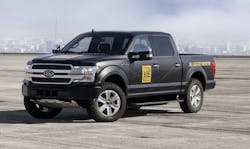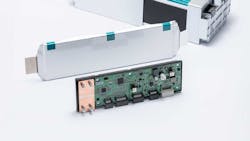ET Readers Choice: Ford leads expanded EV Battery Supply Chain moves in U.S.
(Editor's Note: This story, first published in July, is one of the most-read pieces on EnergyTech this year. We thought we'd share again and move it to the top as we near the end of the year. Ford's announcement preceded a flurry of announcements on energy storage and e-mobility supply chain moves to the U.S.).
July 21--Ford Motor Co. reaffirmed its EV commitment and announced Thursday several new and expanded sourcing initiatives for battery capacity and raw materials to overcome supply chain challenges and help the automaker meet its goal of producing 600,000 electric vehicles annually by next year and 2 million per year by the end of 2026.
Ford is accelerating its EV supply chain and materials access as it also intends to invest $50 billion in EVs through 2026.
“Ford’s new electric vehicle lineup has generated huge enthusiasm and demand, and now we are putting the industrial system in place to scale quickly,” Jim Farley, Ford’s president and CEO and president of Ford Model e, said in a statement. “Our Model e team has moved with speed, focus and creativity to secure the battery capacity and raw materials we need to deliver breakthrough EVs for millions of customers.”
The U.S-based automaker has announced agreements with numerous companies to help confirm the EV supply chain. Those include Contemporary Amperex Technology Co., LG Energy Solution and SK On.
Ford also said it has secured all of the annual battery cell capacity—or about 60 GWh—needed to meet its 600,000 EV run rate goal. The company also will add lithium iron phosphate (LFP) chemistry to its battery cell portfolio. This adds capacity to Ford’s existing nickel cobalt manganese (NCM) chemistry.
This move can reduce reliance on scarcer critical minerals such as nickel and can result in a significant cost savings, the company said. Nickel is plentiful for mining capacity globally, but current events are complicating supply chain deliveries, including the fact that Russia is one of the world’s top producers and exporters of nickel.
Ford is direct-sourcing its battery raw materials.
“Our team has been actively engaged with partners in the United States and around the world,” said Lisa Drake, Ford Model e vice president, EV Industrialization. “We will move fast in the key markets and regions where critical supplies are available, meeting with government officials, mining companies and processors and signing MOUs and agreements that reflect Ford’s ESG expectations and underpin Ford’s plan to bring EVs to millions.”
Non-binding MOUs have been signed with nickle mining producers such as Vale Canada, PT Vale Indonesia, Huayou Cobalt and BHP in Australia.
Contracts with lithium miners include Rio Tinto and Liontown Resources.
Ford announced that Contemporary Amperex Technology Co., Ltd. (CATL) will provide full LFP battery packs for Mustang Mach-E models for North America starting next year as well as F-150 Lightnings in early 2024. Ford’s EV architecture flexibility allows efficient incorporation of CATL’s prismatic LFP cell-to-pack technology, delivering incremental capacity quickly to scale and meet customer demand.
Plus, SK On has installed capacity to support the scaling of Ford’s high-volume F-150 Lightning and E-Transits through late 2023 – scaling NCM cell production beyond earlier-planned levels from its Atlanta facility and providing new battery cell capacity from its Hungary operation.
Beyond EV-focused entities such as Tesla, Rivian and Fisker, the world’s legacy automakers are promising to invest many billions in their own all-electric models. Ford, GM, BMW, Toyota, Honda and Hyundai are several of the biggest firms announcing an eventual shift to mainly EVs in coming years.
-- -- --
(Rod Walton, senior editor for EnergyTech, is a 14-year veteran of covering the energy industry both as a newspaper and trade journalist. He can be reached at [email protected]).
About the Author
Rod Walton, EnergyTech Managing Editor
Managing Editor
For EnergyTech editorial inquiries, please contact Managing Editor Rod Walton at [email protected].
Rod Walton has spent 17 years covering the energy industry as a newspaper and trade journalist. He formerly was energy writer and business editor at the Tulsa World. Later, he spent six years covering the electricity power sector for Pennwell and Clarion Events. He joined Endeavor and EnergyTech in November 2021.
Walton earned his Bachelors degree in journalism from the University of Oklahoma. His career stops include the Moore American, Bartlesville Examiner-Enterprise, Wagoner Tribune and Tulsa World.
EnergyTech is focused on the mission critical and large-scale energy users and their sustainability and resiliency goals. These include the commercial and industrial sectors, as well as the military, universities, data centers and microgrids. The C&I sectors together account for close to 30 percent of greenhouse gas emissions in the U.S.
He was named Managing Editor for Microgrid Knowledge and EnergyTech starting July 1, 2023
Many large-scale energy users such as Fortune 500 companies, and mission-critical users such as military bases, universities, healthcare facilities, public safety and data centers, shifting their energy priorities to reach net-zero carbon goals within the coming decades. These include plans for renewable energy power purchase agreements, but also on-site resiliency projects such as microgrids, combined heat and power, rooftop solar, energy storage, digitalization and building efficiency upgrades.


